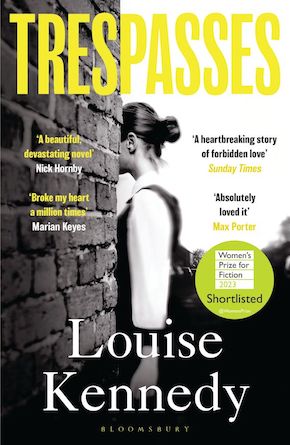Barmaids and landladies in fiction
by Tina Baker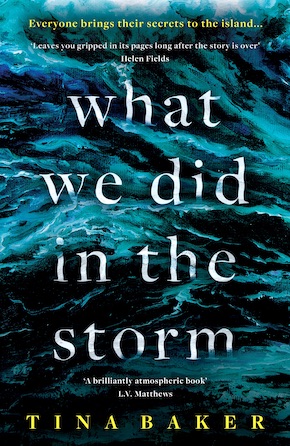
My new psychological thriller What We Did in the Storm is set on the beautiful Isles of Scilly, pitching dark secrets and even darker deeds against stunning scenery. My lead character happens to be a barmaid working on the island, so I blithely suggested compiling a Top Ten list of fictional barmaids and landladies. Easy, I thought.
As a TV critic I’ve watched thousands of hours of soaps over the years, and pubs like Emmerdale’s Woolpack are the heart of all of them. Similarly, the island pub is the heart of the community in my new book. Plus I happened to meet my husband when he worked as a barman at The New Inn on Tresco, so I’d done the research. How I loved the iconic figures who worked behind the bars of TV soaps, from Coronation Street’s original matriarch Annie Walker to EastEnders’ Peggy Mitchell. Landladies are the feisty fulcrums around which all other characters swirl. And the barmaids! The stereotypical tart with a heart like Weatherfield’s Bet Lynch, blonde bimbos like Raquel (Bambi on stilettoes), or hard-faced cows like Walford’s Pat Butcher and Shirley Carter.
These women shaped my life. I worked as a barmaid (The Fox and Goose) during Britain’s longest heatwave, when my tips got bigger as my clothes shrunk. (It was the Seventies. I knew no better.) Like many women I’ve turned my hand to cleaning, waitressing and bar work. But where the hell are we in novels? As a working-class girl, I searched for depictions of people like me throughout my eclectic reading as a kid. (For me it was both Wind in the Willows and The Carpetbaggers, A Bear Called Paddington and The Exorcist.) I was often disappointed.
My world and reading list expanded at university, but now, when it came to remembering ten iconic barmaids in literature, I was stumped. In a panic, I put out the word, asking fellow authors for suggestions. Between us there was a lot of “Wasn’t there a barmaid in…” and “What about The Shining? Oh no, that was a male bartender, wasn’t it…
In the end I could find only three or four truly memorable barmaids from recent novels, all written by women (see below). Most others, I feel, are lacking something.
The also-rans:
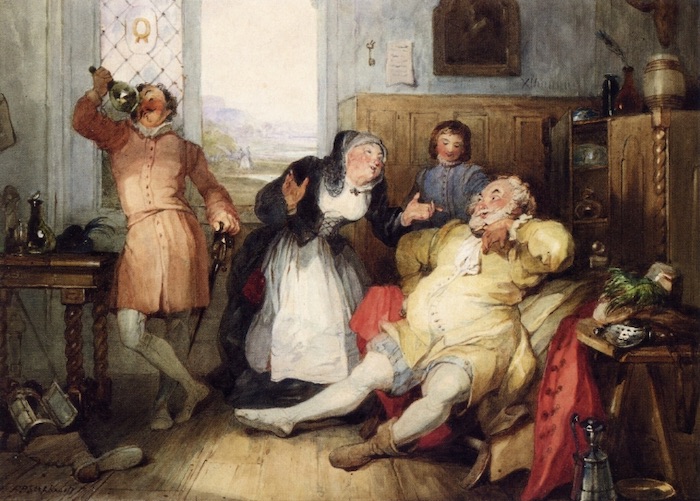
Our man Shakespeare, friend of the groundling, surely had amazing bar staff in his works? Well, there’s Mistress Quickly in The Merry Wives of Windsor and three of the Henry plays, and pre-novel as we know it, that has to count. A classic innkeeper type, her role is to provide comic relief, like her best customer, Falstaff. She’s a somewhat shady character, defender of prostitutes (the brilliantly named Doll Tearsheet!), with a penchant for bawdy double-entendre and malapropisms. But it’s a very small role.
Dickens? Hard Times was all about class. Coming from a town called Coalville, I knew Coketown was no mere metaphor. And there are so many great lowlife characters in his work, a myriad of occupations, plus, in many ways, with his serialisations, he was the first writer of soap operas. I had to be on a winner here. Yes! Nancy in Oliver Twist – surely a shoo-in as both top barmaid and tart with the heart. But…? Actually, I was thinking of the musical Oliver! In the film, flame-haired Nancy’s the fun-loving ‘Oom-Pah-Pah’ barmaid, as well as a thief and fool for love. But in the novel she’s little more than a prostitute and victim. I mean, bar work is hard (and I’ve fallen for my share of scummy men just because they had nice dogs), but it was the dancing on tables joie de vivre of Nancy in the film I loved, more than the written version.
The buxom Arabella, more than anyone, shucked Victorian values, and she had more emotional intelligence than her love rival Sue, or Jude himself. She’s a survivor.”
Balzac? Zola? Kings of the picaresque; pioneers of naturalism? Those lads loved a drink. They had to be knee-deep in barmaids. L’Assommoir? But Zola’s Gervaise is actually a laundress – a punter, an imbiber, rather than a server of the dreaded moreish absinthe. To me she’s that woman in the Degas painting, a forlorn depressed drunk. And we’ve all been there. (Well, I have.)
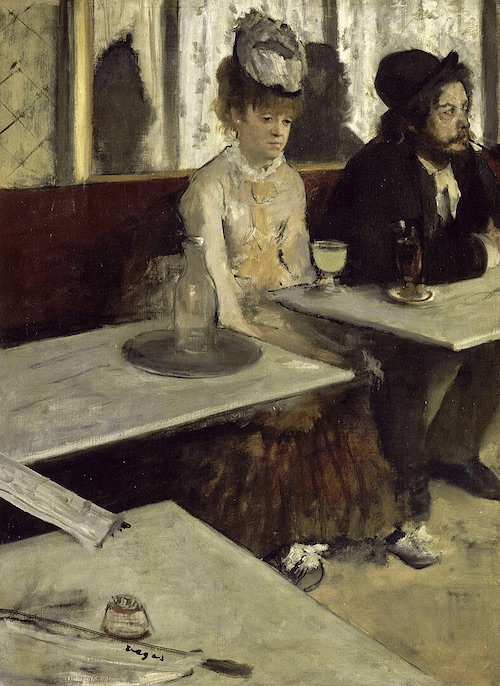
The Sirens in James Joyce’s Ulysses? I have actually read the whole thing (gold star!) but I had no memory of any barmaid. I had to google the chapter to remember Miss Lydia Douce (referred to as Bronze) and Miss Mina Kennedy (Gold). Rather than luring men to their deaths on the rocks, their rubbishy ribald song is merely a distraction. So is the way this section is written, with invented words mimicking musical sounds rather than being anything immediately recognisable. The stylistic device is the more memorable feature here than the characters of the barmaids. Even Ezra Pound struggled with it.
Thomas Hardy came through! My first memorable barmaid is the wicked (to some) Arabella from Jude the Obscure. And she’s a lead character. She tries to trap our hero by pretending to be pregnant! She also represents sex, pure and simple, and the book was banned because of her. The first of my family to go to university, I was Team Jude all the way, so I hated Arabella when I first read this. Coarse, superficial, a liar; she throws his books on the floor! What a cow! Only now I think that was unfair. The buxom Arabella, more than anyone, shucked Victorian values, and she had more emotional intelligence than her love rival Sue, or Jude himself. She’s a survivor.
In the first volume of The Book of Dust, La Belle Sauvage, Philip Pullman features the boy Malcolm, whose parents run The Trout Inn, where gossip and rumour swirl alongside the waters of the Thames. He’s frenemies with teen barmaid Alice, but they band together to rescue little Lyra. It’s a thrilling boat ride, and Alice is brave and resourceful, but this is Malcolm and Lyra’s story, rather than hers and, apart from her kiss with the dangerous Gerard Bonneville, I remember her daemon, Ben, more than I do her.
In Ready to Catch Him Should He Fall, Neil Bartlett’s Madame watches over her city bar, simply known as The Bar, and the lovers Boy (nineteen) and O (the older man). She embodies the matriarchal landlady role, an older, still glamorous woman, looking out for her clients (free condoms) and playing cupid for this glorious gay romance. She, like Ru Paul, is also known as Mother. Such women are resident features of camp iconography.
My Top 3:
Louise Kennedy’s stunning debut novel Trespasses is a number one bestseller for a reason – wonderful and vivid and heartbreaking. Cushla is a teacher who also works shifts in her family’s bar, while falling into an epic, tragic love affair. Not only is her lover much older and married, he’s a Catholic, she’s a Protestant, and this is the Seventies. The relationship is dangerous. The difference between the brutish British soldiers who frequent the pub and Cushla’s urbane Michael is stark. The toe-curling dinner parties he hosts! And very few books make me shout “No!” (startling the cats) when the incident happens. Poor Cushla.
In Cold Water by Gwendoline Riley, Carmel McKisko is a dreamer of small dreams, and a drinker of big drinks. The young barmaid works in a Manchester dive full of barflies and characters in a miasma of fag smoke and memories and lost hope. You can almost feel the sticky carpet. A painfully realistic modern picaresque.
Sarah Winman’s Still Life is one of my favourite novels of the decade, The Stoat and Parrot one of my favourite pubs, and barmaid Peggy a favourite literary character. Evoking Forster’s A Room with a View in the Florence sections, our hero Ulysses returns to a dour Blighty and post-war London. While he’s been away, his wife Peggy has sung a bit, fought off leering punters, oh, and had a child with an American soldier, who she hoped would whisk her away to the States. And she is no mother of the year. Ulysses takes his child back to Florence for a better life, while Peggy becomes embroiled with the vile, controlling Ted. (Even the parrot says, “Don’t do it!”) But she deserves a happy ending. Peggy is tough and hopeless and flawed and, like her relationships, complicated. I love her.
—
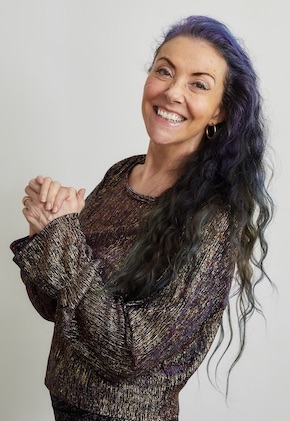
Tina Baker worked as a journalist and broadcaster for thirty years. She’s probably best known as a television critic for the BBC and GMTV, and for winning Celebrity Fit Club. Her debut novel Call Me Mummy (2021) was a #1 Kindle bestseller, and was followed by Nasty Little Cuts (2022) and Make Me Clean (2023). What We Did in the Storm is published in hardback and eBook by Viper Books.
Read more
@tinabakerbooks
@ViperBooks
Author photo by Veerle Evens

